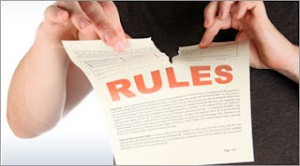 Rules to Maintain Low-Self Esteem
Rules to Maintain Low-Self Esteem
Rule #1: Be perfect. Under no circumstances are you allowed to make a mistake.
Rule #2: Always please others. Even when you are stretched to the limit, say yes to that extra task, appointment, or commitment.
Rule #3: Focus on your flaws. After all, that is the only way self-improvement will happen, right? Don’t focus on your accomplishments- that is egotistical and selfish, and besides, you got lucky.
Rule #4: Ignore your own boundaries and needs. Allow other people take advantage of you, feel angry about it, and see yourself as inferior to them.
Rule #5: Take everything personally. Assume other people’s actions and words are due to your failure as a human being. Obsess about what others think of you.
Do These Rules Seem Familiar?
Most of us have some version of 1 or more of these “rules” operating in our heads. We created these rules at a young age to manage low self-esteem/not feeling good about ourselves. For example, if a child is criticized a lot, that child might invent the “be perfect” rule to try and avoid being criticized and to avoid the feelings associated with being criticized. “If I can only be perfect I won’t have to feel this way….” Thus, the rule gains power and is the key to not having to feel inadequate, vulnerable, sad, angry, and/or whatever other feelings may arise when criticized. Thus, the incredible pressure to “be perfect” is born.
The Effects of the Rules
Enforcing these kinds of rules on ourselves is a set up for continuing to have low-self esteem. No one is perfect. It is impossible to always please others. Focusing entirely on your flaws and disregarding your strengths is not an accurate depiction of yourself. Ignoring your own boundaries and needs can cause health problems, stress, anxiety, and depression. Taking everything personally is a very narrow perspective through which to view the world. People’s actions and words are due to a variety of factors including their life experiences, what kind of a mood they woke up in, and what is happening in their personal relationships, to name a few.
Breaking the Rules
Rules are made to be broken, right? When you are struggling with low-self esteem, ask yourself, “Is there an unreasonable rule that I am enforcing on myself right now?” See if you can poke holes in the logic of the rule. For example, if you are following the rule to always please others, you could question that rule by reminding yourself, “It is impossible to always please others.”
If I Don’t Follow The Rules I Will Be a Bad Person
Most of us have instated self harming rules as a way to keep ourselves in line, or be “good.” However, rules like the examples given above create self-aggression. If we want to be “good” i.e. available, compassionate, understanding, patient, honest, caring etc. with others, we first need to be able to do so with ourselves. Setting up strict, unrealistic, impossible, and self-aggressive rules is counter-productive.
It’s You Don’t Have to Be Perfect Day
June (not her real name) was struggling with low-self esteem and would constantly scrutinize her every decision and action at work. She was convinced that others were focusing on her mistakes and incompetence. We talked about her self-imposed rule- that she needed to be perfect to be competent, and how harsh and unfair that was. “Isn’t it possible to be competent and mistakes?” I asked. June came up with a creative way to work with her perfectionism and negative beliefs about herself by creating: “Today is You Don’t Have To Be Perfect Day!” She decided to let herself have one day where she would be allowed to make mistakes, after all, it was “You Don’t Have to Be Perfect Day.” By allowing herself a day off, June was able to notice that her mood and interactions with others improved. Since she was no longer scrutinizing her every move at work, she worried less that others were doing so. Having this break from following the rule offered her an insight into a different way of being that is possible.
Re-Write the Rules:
Rule #1: It is ok to make mistakes. In the famous words of Miles Davis, “Do not fear mistakes, there are none.”
Rule #2: It is not my responsibility to please others.
Rule #3: Focusing on my strengths, accomplishments, and successes is more likely to yield a positive self image.
Rule #4: Honoring my own boundaries and needs are essential for my physical, emotional, and spiritual well being.
Rule #5: Don’t take anything personally – doing so is a very narrow perspective on any situation.
If there is another harsh rule that you hold yourself to, how about re-writing it now?
____________________________________________________________________________

